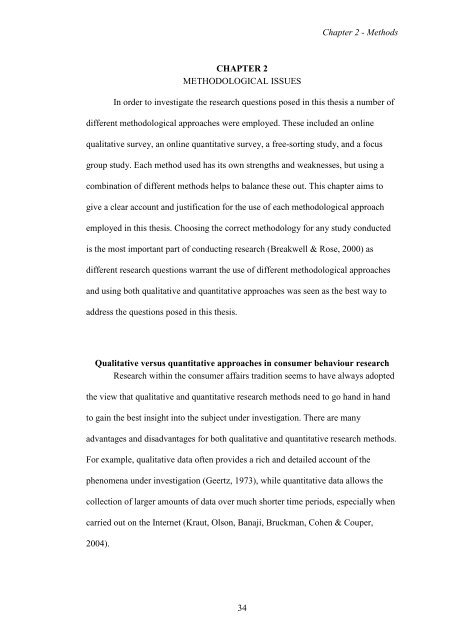CHAPTER 1 - University of Exeter
CHAPTER 1 - University of Exeter
CHAPTER 1 - University of Exeter
You also want an ePaper? Increase the reach of your titles
YUMPU automatically turns print PDFs into web optimized ePapers that Google loves.
<strong>CHAPTER</strong> 2<br />
METHODOLOGICAL ISSUES<br />
34<br />
Chapter 2 - Methods<br />
In order to investigate the research questions posed in this thesis a number <strong>of</strong><br />
different methodological approaches were employed. These included an online<br />
qualitative survey, an online quantitative survey, a free-sorting study, and a focus<br />
group study. Each method used has its own strengths and weaknesses, but using a<br />
combination <strong>of</strong> different methods helps to balance these out. This chapter aims to<br />
give a clear account and justification for the use <strong>of</strong> each methodological approach<br />
employed in this thesis. Choosing the correct methodology for any study conducted<br />
is the most important part <strong>of</strong> conducting research (Breakwell & Rose, 2000) as<br />
different research questions warrant the use <strong>of</strong> different methodological approaches<br />
and using both qualitative and quantitative approaches was seen as the best way to<br />
address the questions posed in this thesis.<br />
Qualitative versus quantitative approaches in consumer behaviour research<br />
Research within the consumer affairs tradition seems to have always adopted<br />
the view that qualitative and quantitative research methods need to go hand in hand<br />
to gain the best insight into the subject under investigation. There are many<br />
advantages and disadvantages for both qualitative and quantitative research methods.<br />
For example, qualitative data <strong>of</strong>ten provides a rich and detailed account <strong>of</strong> the<br />
phenomena under investigation (Geertz, 1973), while quantitative data allows the<br />
collection <strong>of</strong> larger amounts <strong>of</strong> data over much shorter time periods, especially when<br />
carried out on the Internet (Kraut, Olson, Banaji, Bruckman, Cohen & Couper,<br />
2004).
















